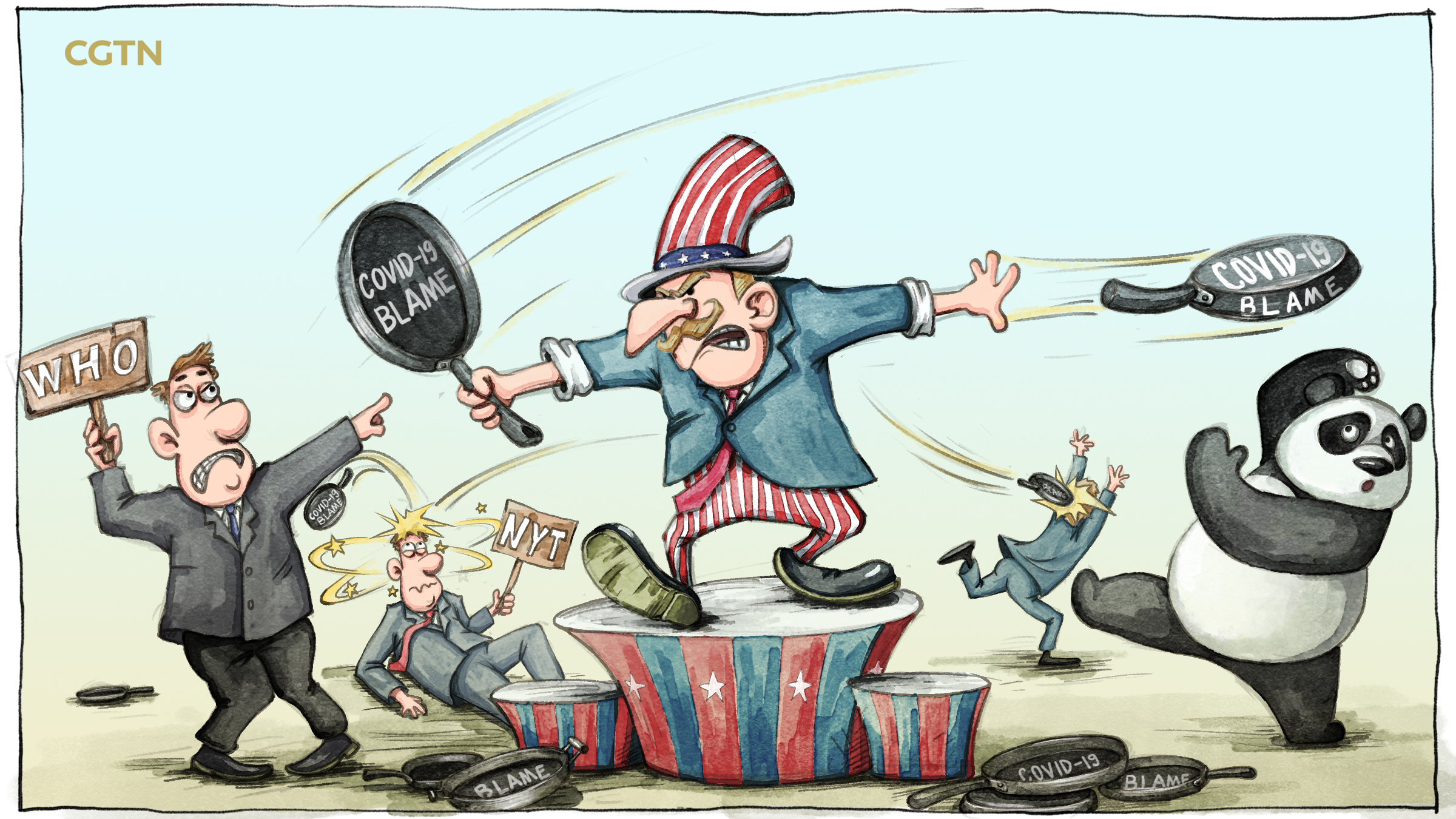
Editor's note: CGTN's First Voice provides instant commentary on breaking stories. The daily column clarifies emerging issues and better defines the news agenda, offering a Chinese perspective on the latest global events.
It is easy to lose focus if you have been a keen follower of U.S. President Donald Trump's blame game regarding the COVID-19 outbreak: the Obama administration, media, China, and now apparently World Health Organization (WHO).
As the number of confirmed COVID-19 cases tops 600,000 in the U.S., Trump has announced that the U.S. would withhold its funding to the WHO, which accounts for 15 percent of its total budget. The decision is based on, according to Trump, WHO's "severely mismanaging and covering up" the spread of the coronavirus.
Let's get the facts straight first.
The main point that Trump was making was that the WHO "opposed" his decision to close U.S. borders to Chinese travelers at the end of January, which he repeatedly boasted over the next two months.
The problem is, travel restriction is not the master key. Surveillance, monitor, early detections – all have been included in the WHO's suggestions but effectively been neglected by the Trump administration. While the travel ban did buy some time to delay the outbreak, this period was unfortunately wasted as he was busy playing it down to gain more votes and stabilize stock markets.
The erroneous judgment and irresponsible response by the Trump administration have already been revealed by major media outlets in the U.S. There were warning signs from the outset from January by different advisers, but the administration only started to take decisive measures from mid-March.

The U.S. has been changing its target to blame instead of looking into its own failures. /CGTN
The U.S. has been changing its target to blame instead of looking into its own failures. /CGTN
The Washington Post has summarized it the best: "If the coronavirus has exposed the country's misplaced confidence in its ability to handle a crisis, it also has cast harsh light on the limits of Trump's approach to the presidency — his disdain for facts, science and experience."
It is a harsh reality for American elites that the world ceased to see America as a lighthouse amid the global crisis. Leadership, responsibility, commitment – those charming charters are somehow lost in the strongest country in the world. Instead, countries are witnessing isolation, polarization, and the brazen commitment to the America First doctrine.
During the Ebola crisis in 2014, the United States organized a U.S.-Africa Leaders Summit in Washington to help Africa combat the outbreak; over the years, the world is witnessing the country asking more money and commitments in terms of military, trade and climate. It almost comes as a humiliation to the U.S. when China is offering both medical supplies and the "China experience" to the world, while itself needs help. Leadership is not just about power. It is more about reliability, credibility and the willingness to lead, which was not seen in the Trump administration.
The dilemma is: Uncle Sam would still like to lead the world by being an important part of different world organizations, only if those organizations are pushing the same agenda as America's and filled with American employees.
According to a report by the Wall Street Journal, the discussion to cut funding to international organizations has started long before the COVID-19 pandemic, as the administration is linking funding to the number of American citizens hired by that organization.
This sense of insecurity and being "threatened" has its roots in the growing influence of China in different international agencies. "When I left in 2006, China was nowhere to be seen inside UN organizations," said Kevin Moley, who served in both Bush and Trump administrations in an interview with the WSJ, "When I came back under President Trump, the landscape was unrecognizable. The Chinese were everywhere."
Especially with the WHO, last week, when Trump first made the threat to cut WHO funding, he complained that the organization is "biased toward China," only because China's containment measures have gained positive assessment from the WHO. But the simple fact is that China's resolute actions have proven to be effective and the country is already resuming to full operation after the lockdown was lifted on Wuhan.
Perhaps it has to take the WHO to also join the blame game with the U.S. to accuse China for the Trump administration to consider contributing again. Apparently, for the U.S., the funding is not a support to international cooperation and solidarity: It is an investment. The payback has to be the organization's willingness to slide with the U.S. in terms of foreign policy. Otherwise, it's just money down the drain.
And there's the ultimate dilemma: The Trump administration has to keep looking for new targets to blame whenever there's an internal failure. By unloading its international responsibility and retreating from international organizations, the U.S. is left increasingly isolated to push its foreign policy agenda. It may soon find itself becoming the world leader again, only with no one following.
Script: Zhao Yuanzhen
(If you want to contribute and have specific expertise, please contact us at opinions@cgtn.com.)